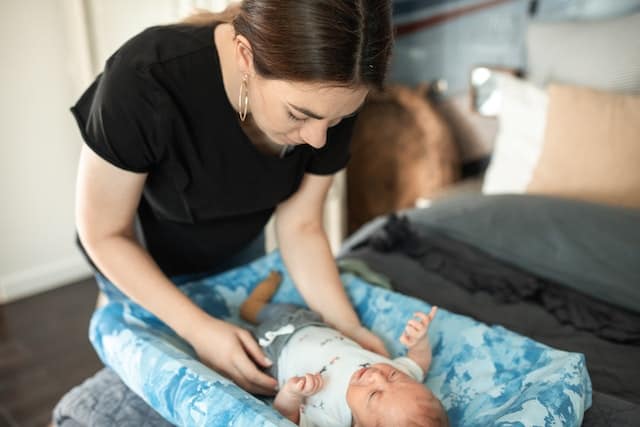Newborn gasping for air is a common phenomenon that occurs immediately after birth. It is a reflex action that helps the baby to breathe and get oxygen into their lungs.
The gasping is usually followed by crying, which helps to clear the baby’s airways and establish normal breathing. While gasping may seem alarming to new parents, it is a normal part of the birthing process and usually resolves on its own.
Understanding the reasons behind newborn gasping for air can help parents feel more at ease. There are several causes of gasping, including the transition from the womb to the outside world, the compression of the baby’s chest during delivery, and the presence of amniotic fluid in the lungs.
In some cases, gasping can also be a sign of underlying health issues, such as respiratory distress syndrome or meconium aspiration syndrome.
Key Takeaways
- Newborn gasping for air is a normal part of the birthing process.
- Gasping is a reflex action that helps babies to breathe and get oxygen into their lungs.
- While gasping is usually harmless, it can sometimes be a sign of underlying health issues.
Understanding Newborn Gasping for Air

Newborn gasping for air can be a common occurrence and it is important for parents to understand the reasons behind it. Gasping for air can occur during the first few days of a baby’s life and can be a cause for concern for new parents.
One of the reasons for gasping for air is due to the baby’s respiratory system still adjusting to the outside world. When a baby is in the womb, they receive oxygen through the umbilical cord and do not need to breathe on their own.
After birth, the baby’s respiratory system needs to adjust to breathing air independently. This can lead to temporary gasping for air as the baby’s body adjusts.
Another reason for gasping for air is due to difficulty breathing. This can be caused by a variety of factors such as a blocked airway, respiratory distress syndrome, or an infection.
It is important to monitor the baby’s breathing patterns and if there are any concerns, seek medical attention immediately.
Parents can also take steps to help prevent gasping for air in newborns. This includes keeping the baby’s sleeping area clear of any objects that could obstruct their airway, such as blankets or pillows.
Additionally, ensuring that the baby is positioned on their back during sleep can also help prevent gasping for air.
In summary, newborn gasping for air can be a common occurrence as the baby’s respiratory system adjusts to breathing air independently. However, if there are concerns about the baby’s breathing patterns, it is important to seek medical attention immediately.
Parents can also take steps to help prevent gasping for air by keeping the baby’s sleeping area clear and ensuring they are positioned on their back during sleep.
Causes of Newborn Gasping for Air
Newborns gasping for air is not uncommon and can be caused by a variety of factors. Some of the most common causes of newborn gasping for air include:
- Respiratory Distress Syndrome: This is a condition that affects premature babies and occurs when their lungs are not fully developed. This can result in difficulty breathing and gasping for air.
- Laryngomalacia: This is a condition where the cartilage in the larynx is soft and floppy, causing it to collapse and obstruct the airway. This can result in gasping for air and stridor (a high-pitched sound when breathing).
- Obstructive Sleep Apnea: This is a condition where the airway is partially or completely blocked during sleep, causing pauses in breathing and gasping for air.
- Gastroesophageal Reflux Disease (GERD): This is a condition where stomach acid flows back into the esophagus, causing irritation and inflammation. This can result in gasping for air and difficulty breathing.
- Respiratory Infections: Newborns are susceptible to respiratory infections such as pneumonia and bronchitis, which can cause gasping for air and difficulty breathing.
- Meconium Aspiration Syndrome: This is a condition where a newborn inhales meconium (the first stool) during delivery, which can cause gasping for air and breathing difficulties.
It is important to note that gasping for air can also be a symptom of more serious conditions such as pertussis (whooping cough) and asthma. If a newborn is gasping for air, it is important to seek medical attention immediately to determine the underlying cause and provide appropriate treatment.
Symptoms and Signs

Newborn gasping for air can be a concerning sight for parents and caregivers. Some common symptoms and signs to look out for include:
- Coughing: Newborns may cough as a reflex to clear their airways. However, persistent coughing could be a sign of an underlying respiratory problem.
- Fever: A fever in a newborn can be a sign of an infection. It is important to monitor the baby’s temperature and seek medical attention if it rises above 100.4°F.
- Vomiting: Newborns may vomit due to a number of reasons, including overfeeding or a digestive issue. However, if the vomiting is persistent or accompanied by other symptoms, it could be a sign of a more serious condition.
- Choking: Newborns may choke on milk or other fluids while feeding. It is important to learn how to properly position and feed a newborn to prevent choking incidents.
- Noisy breathing: Newborns may make noises while breathing due to their underdeveloped respiratory system. However, if the noise is persistent or accompanied by other symptoms, it could be a sign of respiratory distress syndrome.
- Labored breathing: Newborns may have difficulty breathing due to a variety of reasons. If the baby is breathing rapidly or with difficulty, it could be a sign of respiratory distress.
- Hiccups: Hiccups are common in newborns and usually harmless. However, persistent hiccups could be a sign of an underlying condition.
- Panting: Newborns may pant or breathe rapidly when they are overheated or overstimulated. It is important to keep the baby cool and calm to prevent panting episodes.
- Persistent coughing: As mentioned earlier, persistent coughing could be a sign of an underlying respiratory problem. It is important to seek medical attention if the coughing persists.
- Fatigue: Newborns sleep a lot, but if the baby is excessively tired or lethargic, it could be a sign of an underlying condition.
- Cyanosis: Cyanosis is a bluish tint to the skin that can indicate a lack of oxygen in the blood. If the baby’s skin turns blue, it is important to seek medical attention immediately.
It is important to note that some of these symptoms and signs may be normal for newborns, while others may be a cause for concern. If parents or caregivers are unsure about a symptom or sign, it is always best to seek medical attention to ensure the baby’s health and well-being.
Diagnosis and Treatment
When a newborn gasps for air, it can be a concerning experience for parents. However, it is important to understand the possible causes and appropriate treatment options.
If a newborn is gasping for air, it is important to seek medical attention from a pediatrician immediately. The pediatrician will perform a physical examination and may order diagnostic tests such as X-rays or blood tests to determine the underlying cause.
Possible causes of gasping for air in newborns include respiratory distress syndrome, pneumonia, or congenital heart defects. Treatment options will depend on the underlying cause and may include medication or surgery.
In some cases, vaccination can also be an important preventive measure against certain respiratory illnesses that can cause gasping for air in newborns.
Overall, it is important to seek prompt medical attention and follow the recommended treatment plan to ensure the best possible outcome for the newborn.
Prevention and Home Remedies

Preventing gasps for air in newborns is crucial for their overall health and well-being. There are several ways parents can take action to reduce the likelihood of their baby experiencing gasps for air.
Pregnancy
One of the best ways to prevent gasps for air in newborns is to ensure a healthy pregnancy. Mothers should strive to maintain a healthy weight, avoid smoking and second-hand smoke, and attend regular prenatal check-ups.
Proper Positioning
Proper positioning during feeding and sleeping can help prevent gasps for air. Babies should be placed on their backs to sleep, and their heads should be elevated slightly during feeding to prevent choking.
Clean Air
Clean air is essential for newborns. Parents should ensure that the air in their home is free of pollutants, such as cigarette smoke, and use a cold mist humidifier to keep the air moist.
Home Remedies
There are several home remedies that can help prevent gasps for air in newborns. Saline solution can be used to clear a baby’s nasal passages, and a nasal aspirator can be used to remove mucus. A warm bath can also help relax a baby’s airways and make breathing easier.
Periodic Breathing
Periodic breathing is a common occurrence in newborns and is characterized by short pauses in breathing. While it can be alarming for parents, it is usually not a cause for concern. However, if a baby experiences gasps for air or long pauses in breathing, parents should seek medical attention immediately.
Feeding Babies
Feeding babies on a regular schedule can help prevent gasps for air. Parents should also ensure that their baby is getting enough milk and is gaining weight properly.
In conclusion, preventing gasps for air in newborns is essential for their health and well-being. By taking preventative measures and using home remedies, parents can help ensure that their baby is healthy and happy.
Special Considerations for Preemies
Preemie babies are born before completing 37 weeks of gestation. They are at a higher risk of developing respiratory problems because their lungs are not fully developed.
Preemie babies have immature respiratory systems and may not have enough surfactant, a substance that helps keep the alveoli (tiny air sacs in the lungs) open. This can cause difficulty in breathing and lead to infant death.
Parents of preemie babies should be aware of the special considerations that come with their infant’s immature respiratory system. They should monitor their baby’s breathing and watch for signs of distress, such as grunting or flaring of the nostrils.
It is important to note that preemie babies are at a higher risk of developing reflux problems, which can further complicate breathing. Parents should consult their pediatrician if they suspect their baby has reflux.
Preemie babies may require special equipment to help them breathe, such as a nasal cannula or CPAP machine. These devices can help deliver oxygen to the baby’s lungs and make it easier for them to breathe.
In summary, preemie babies require special considerations when it comes to their respiratory health. Parents should be vigilant and monitor their baby’s breathing, watch for signs of distress, and consult their pediatrician if they suspect any problems. With proper care and attention, preemie babies can grow up to be healthy and strong.
Related Posts:
Frequently Asked Questions
Is it normal for a newborn to gasp for air?
Yes, it is normal for newborns to gasp for air occasionally. This is because their respiratory system is still developing, and they are learning to regulate their breathing.
Newborns also have a reflex called the Moro reflex, which causes them to startle and take a quick breath.
Why does my newborn sound like he’s gasping for air?
Newborns may sound like they are gasping for air due to their underdeveloped respiratory system. They may also have excess mucus or amniotic fluid in their airways, which can make breathing sound noisy or labored.
However, if your newborn is having trouble breathing or is turning blue, seek medical attention immediately.
When should I be worried about my newborn’s breathing?
You should be worried about your newborn’s breathing if they are struggling to breathe, have a bluish tint to their skin, or are not feeding well. Other signs of respiratory distress in newborns include grunting, flaring nostrils, and retracting between the ribs or under the breastbone.
What are the possible causes of a baby gasping for air?
Possible causes of a baby gasping for air include respiratory distress, infections, congenital heart defects, and conditions that affect the airways, such as laryngomalacia. It is important to seek medical attention if you are concerned about your baby’s breathing.
Can laryngomalacia cause SIDS?
Laryngomalacia is a condition where the tissues of the larynx are soft and floppy, which can cause noisy breathing and difficulty breathing. While laryngomalacia is not a direct cause of SIDS, it can increase the risk of SIDS if the baby has other risk factors, such as sleeping on their stomach or being exposed to secondhand smoke.
How can I help my baby breathe easier if they are gasping for air?
If your baby is gasping for air, there are several things you can do to help them breathe easier. These include keeping their airways clear of mucus, using a humidifier to moisten the air, and keeping them in an upright position while feeding.
If your baby is having trouble breathing, seek medical attention immediately.

Iesha is a loving mother of 2 beautiful children. She’s an active parent who enjoys indoor and outdoor adventures with her family. Her mission is to share practical and realistic parenting advice to help the parenting community becoming stronger.
